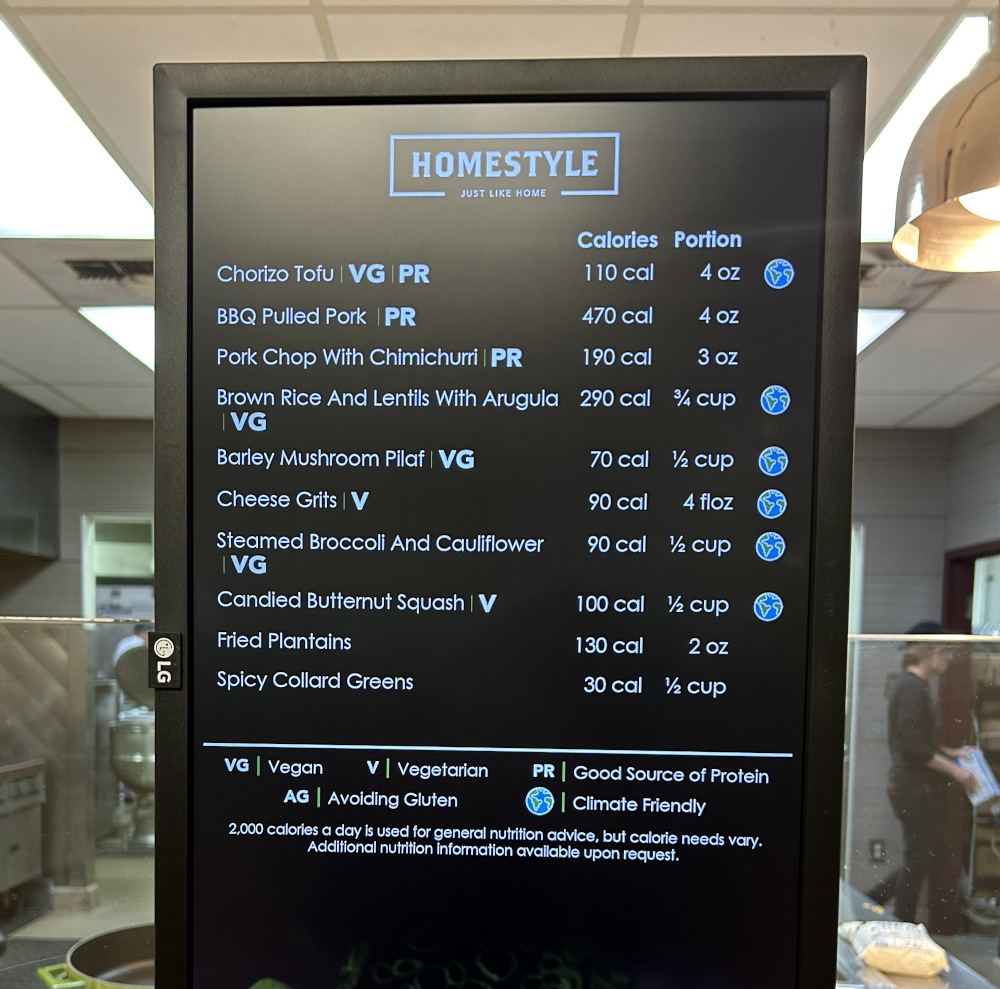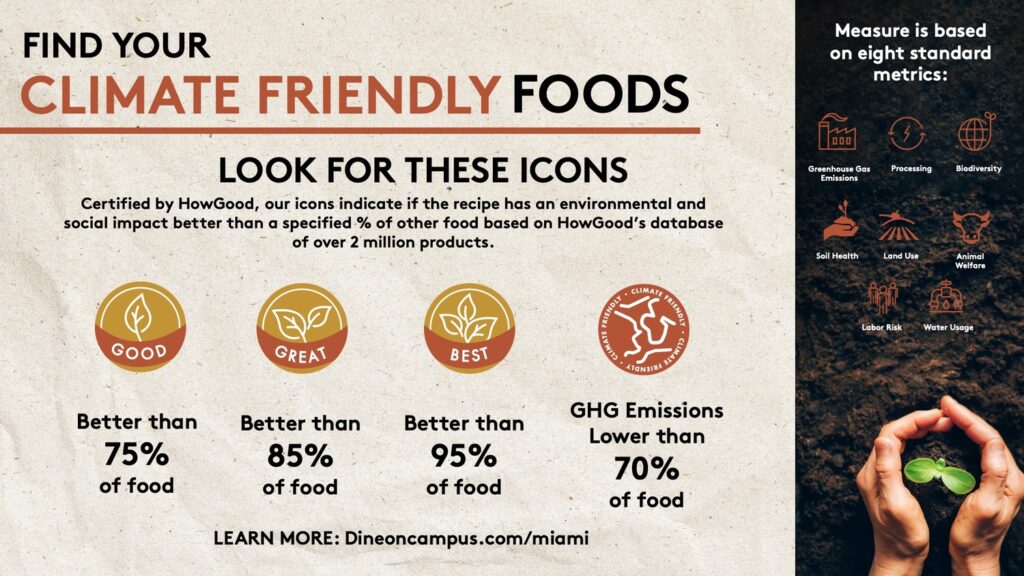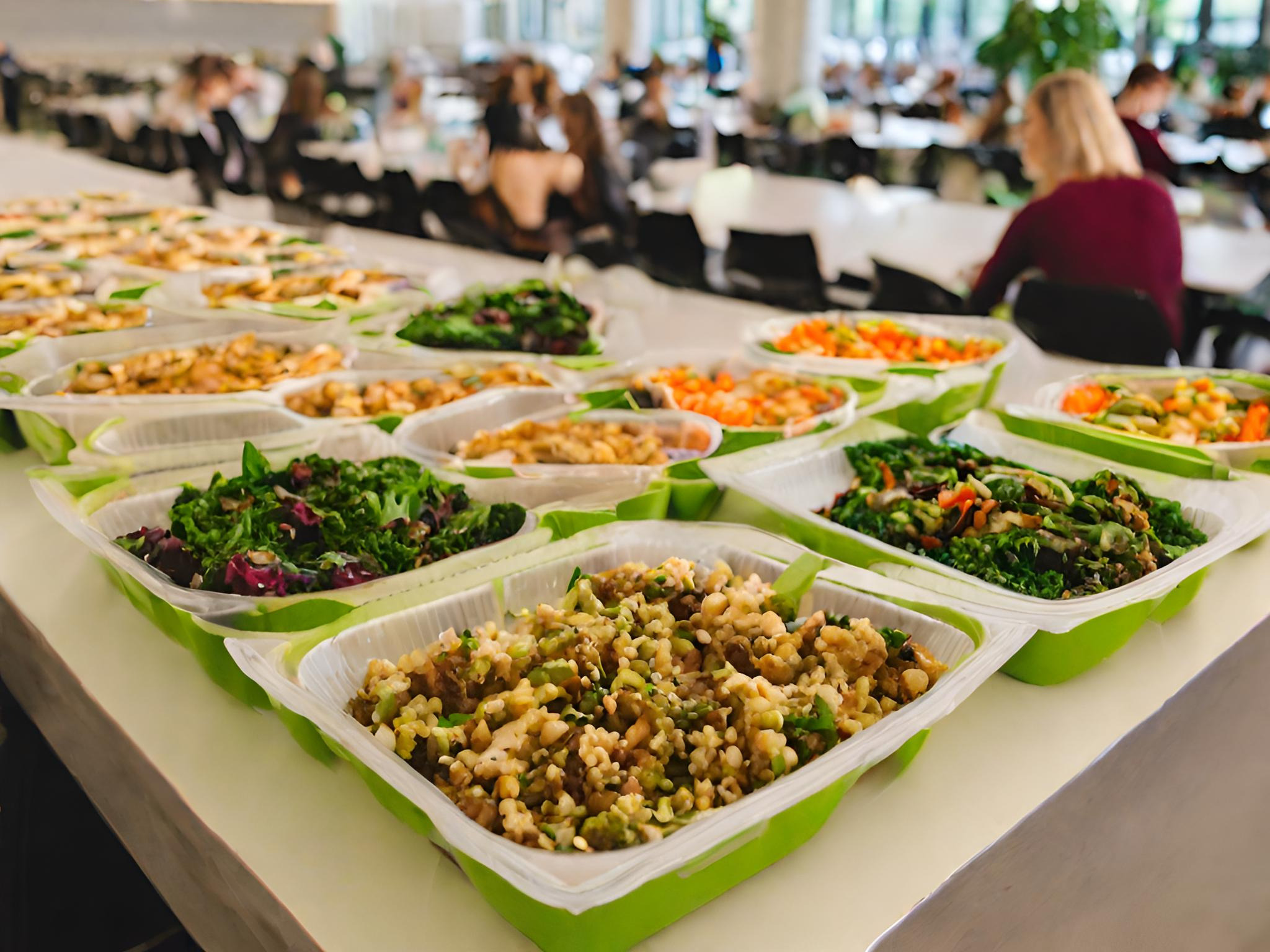Carbon Labelling on University Catering Menus Increases Student Demand for Climate-Friendly Meals
5 Mins Read
A year after announcing its carbon labelling partnership with research firm HowGood, catering company Chartwells Higher Education has revealed that there has been an increase in students looking for climate-friendly meals in US universities and colleges.
In May 2022, Chartwells Higher Ed collaborated with HowGood, which boasts the largest database of ingredient and product sustainability (covering over 33,000 ingredients), to label college and university catering menus in the US with the environmental footprint of dishes.
The overall sustainability of these meals was assessed via eight impact metrics: greenhouse gas emissions, processing, water usage, soil health, land use, working conditions, biodiversity, and animal welfare. Chartwells recipes were rated based on these metrics, and labels were displayed on dining hall menus and digital signage at partner campuses of the catering company, which serves over 300 educational institutes across the US.
A year on, Chartwells and HowGood are now revealing the initial results from their partnership, suggesting that student demand for lower-impact recipes has significantly increased after the introduction of the climate labels.

Using HowGood’s platform to cut recipe emissions
Chartwells recorded a 37% rise in the production of recipes that received positive HowGood ratings. In autumn 2022, less than a third of its recipes got positive scores, but now, 44% boast a positive rating. The catering company plans to increase this number further, using emissions-reducing potential as a criterion in its recipe development and innovation, along with other factors like nutrition, taste and cost.
“We were thrilled to be the first and only foodservice provider to introduce holistic climate labels to university dining halls,” said Chartwells Higher Ed sustainability director Monalisa Prasad. “The feedback so far from students and campus partners has been overwhelmingly positive. We’re continuing to improve the programme by offering a broader range of low-impact menu options and making positive impacts easier to understand through measures like simplified iconography.”
Chartwells is using HowGood’s proprietary digital platform, Latis, to improve its recipes based on GHG-reducing potential. It enables the caterer to test and innovate menu options with ingredient-level insights across the aforementioned metrics, which help the company and partner institutions advance their climate goals by increasing the number of sustainable meals on menus and helping students make more informed food choices.
“When Chartwells brought us the idea of adding climate labels to the dining halls, we were immediately sold – it was the exact kind of innovative and sustainably-focused thinking we’ve come to expect from Chartwells,” said Julie Bannister, assistant vice chancellor for auxiliary services University of Pittsburgh, a Chartwells partner campus. “Our university’s goal is to be carbon-neutral by 2037, and we’re thankful to have a foodservice partner that not only helps us achieve that goal, but empowers our students to make their own decisions that are better for the planet.”

Climate-friendly caterers
The partnership between Chartwells and HowGood came a year after the former’s parent company, the British catering giant Compass Group, announced its plans to replace 40% of the animal proteins throughout its supply chain with alternative sources like plant-based meat, in an effort to reduce its carbon footprint.
“[Chartwells’] commitment to sustainability can be seen not only in their transparent communications with students, but also in their carbon-reduction-focused recipe development work,” said HowGood growth and innovation director Christina Lampert. “It has been a joy to enable them with the tools they need to do both, and we are so pleased to see such clear results one year into our partnership.”
In fact, the UK saw over 650 academics and campaigners write an open letter to UK universities earlier this year, calling for a switch to a 100% vegan catering menu to fight the climate crisis. Many institutes have already voted to introduce fully plant-based menus at their eateries, including the Universities of Stirling, Birmingham, Queen Mary, London Metropolitan, Kent, University College London and Cambridge.
Meanwhile, French catering giant Sodexo found that 10% of all meals sold at its UK and Ireland sites in 2022 were vegan or vegetarian – up from 8% in 2021 (although educational institutes only accounted for 5% of the share). The company has pledged to increase the number of plant-based options to 33% by 2025, which follows its plan to turn 42% of its menus across US universities and colleges plant-based too. Within the US, Sodexo has partnered with Israeli food tech startup SavorEat to launch the first 3D-printing robot for plant-based burgers at the University of Denver.

Consumer attitudes and brand action
The Chartwells-HowGood partnership is a useful gauge for consumer attitudes towards climate labels and sustainable food. In 2020, Carbon Trust carried out an analysis of three global YouGov polls totalling 10,540 participants, finding that two-thirds of respondents find carbon labelling a good idea across all countries surveyed.
Another survey found that most consumers are willing to pay more for food with a lower climate footprint, and last month, a study revealed how “food companies can enhance their sustainability efforts by prompting customers to think before nudging them into consuming more sustainable food”.
Companies like Quorn, Chipotle, Hilton, Just Salad and Oatly have already introduced carbon labelling on their packaging or menus, with the latter calling for a mandatory implementation of the practice. Services such as Planet FWD, My Emissions, Foodsteps, Reewild and Klimato can help food businesses cut their emissions and better label their products.
The news comes the same month the UN climate summit COP28 begins. Previous editions have seen menus labelled with the carbon emissions of each dish, and this year’s conference is supposed to be focused on food more than ever before. Last month, the UAE presidency announced that two-thirds of all food served at the conference will be vegan or vegetarian.



